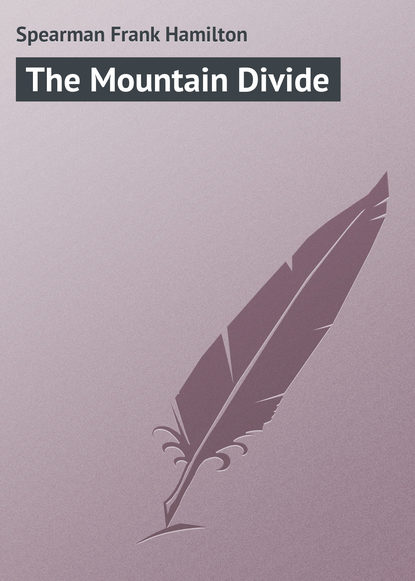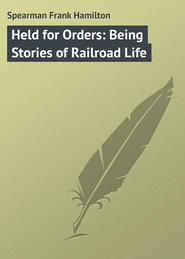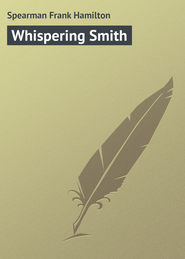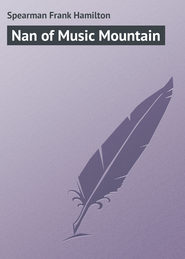По всем вопросам обращайтесь на: info@litportal.ru
(©) 2003-2024.
✖
The Mountain Divide
Автор
Год написания книги
2017
Настройки чтения
Размер шрифта
Высота строк
Поля
“Gosh darn it, why didn’t you jump, as I told you?” exclaimed the lineman, setting him up on his feet. “You pretty near clean upset us both.”
“Where are we, Bill?” muttered Bucks, swallowing his shock.
“Right here at the water, and them fellows up there beating the bush for us. There’s shooting down town, too. Some new deviltry. How good a swimmer are you, Bucks? By gum, I forgot to ask you before you started.”
“I can swim better than I can climb, Bill.”
“We’ve only a quarter of a mile and downstream at that. And the current here would float a keg of nails.”
“How about rocks, Bill?” asked Bucks, peering dubiously toward the roar of the rushing river.
“All up-stream from here,” returned Dancing, edging down the shelving table toward the water. “Lock arms with me so I don’t lose you, sonny. What in Sam Hill is that?”
Far down the river the two saw a tongue of flame leaping into the sky. They watched it for a moment. Dancing was the first to locate the conflagration, which grew now, even as they looked, by leaps and bounds. The two stood ready to plunge into the river when a fire of musketry echoed up the gorge. The lineman clutched Bucks’s arm.
“There’s fighting going on down there now. What’s that smokestack? By Jing, the roundhouse is on fire!”
CHAPTER XXII
They plunged together into the river. The water, icy cold, was a shock, but Dancing had made no mistake. They were below the rocks and needed only to steady themselves as the resistless current swept them down toward the railroad yards.
Bucks demonstrated that he could swim and the two seemed hardly in the water before they could fully see the burning roundhouse. A moment later, chilled to the bone but with his mind cleared by the sharp plunge, Bucks felt his companion’s arm drawing him toward the farther shore where, in the slack water of an elbow of the stream, Dancing led the way across a shoal of gravel and Bucks waded after him up the riverbank.
They hastened together across the dark railroad yard. The sound of firing came again from the square in front of the railroad station and thither they directed their fleeing feet. To the right they heard the shouts of the men who were fighting the fire at the roundhouse and the hot crackling of the flames. They reached the station together and entered the waiting-room by a rear door.
Men were running everywhere in and out of the building and the waiting-room was barricaded for war. Bill Dancing caught a passing trainman by the arm.
“What’s going on here?”
The man looked at the lineman and his companion in surprise: “The gamblers are driving the vigilantes, Bill. They’ve got all Front Street. What’s the matter with you?”
Dancing caught sight of Bob Scott coming down the rear stairway with an armful of rifles, and, without answering the question, called to him.
“Hello!” exclaimed Scott halting. He started as he saw Bucks. “Were you with him? And I’ve been scouring the town for you! Stanley will have a word to say to you, youngster. They thought the gamblers had you, Bill,” he added, turning to the lineman.
Dancing, a sight from the pounding he had taken, his clothing in tatters, and with the blood-stains now streaked by the water dripping from his hair, drew himself up. “I hope you didn’t think so, Bob? Did they reckon a handful of blacklegs would get me?”
Scott grinned inscrutably. “They’ve got the best part of your shirt, Bill. How did you get off?”
“Swam for it,” muttered Dancing, shaking himself. “Where’s Stanley?”
“Out behind the flat cars. He is arming the vigilantes. We’ve fenced off the yards with loaded freight-cars. They’ve fired the roundhouse on us, but the rifles and ammunition that came to-night are upstairs here. Take some of these guns, Bill, and hand them around in front. Bucks can follow you with a box of ammunition.”
Scott spoke hurriedly and ran out of the door facing Front Street Square. A string of flat cars had been run along the house-track in front of the station, and behind these the hard-pressed vigilantes, reinforced now by the railroad men, were taking up a new line of defence. Driven through the town in a running battle, they were in straits when they reached Stanley’s barricade.
Following a resolve already well defined, the railroad chief conferred with the vigilante leaders for a brief moment. He called them to his office and denounced the folly of half-way measures.
“You see,” said Stanley, pointing to two dead men whom the discomfited business men had brought off with them, “what temporizing has done. There is only one way to treat with these people.” He was interrupted by firing from across the square. “In an hour they will have every store in Front Street looted.”
The deliberation for a few moments was a stormy one, but Stanley held his ground. “Desperate diseases, gentlemen,” he said, addressing Atkinson and his companions, “require desperate remedies, and you must sometime come to what I propose.”
“What you propose,” returned Atkinson gloomily, “will ruin us.”
Stanley answered with composure: “You are ruined now. What you should consider is whether, if you don’t cut this cancer of gambling, outlawry, and murder out while you have a chance, it won’t remain to plague you as long as you do business in Medicine Bend, and remain to ruin you periodically. This is always going to be a town and a big one. As long as this railroad is operated, this ground where we stand is and must be the chief operating point for the whole mountain division. You and I may be wiped out of existence and the railroad will go on as before. But it is for you to accept or reject what I propose as the riddance of this curse to your community.
“The railroad has been drawn into this fight by assault upon its men. It can meet violence with violence and protect itself, or it can temporarily abandon a town where protection is not afforded its lives and property. In an emergency, trains could be run through Medicine Bend without stopping. The right of way could be manned with soldiers. But the railroad can’t supply men enough to preserve in your town the law and order which you yourselves ought to preserve. And if we were compelled to build division facilities, temporarily, elsewhere, while they would ultimately come back here, it might be years before they did so. What else but your ruin would this mean?”
He had hardly ceased speaking when the conference was broken in upon. Bob Scott ushered in two men sent under a flag of truce from the rioters. The offer they brought was that Rebstock and Seagrue should be surrendered, provided Stanley would give his personal pledge that the two should not be shot but sent out of town until peace was restored, and that they should be accorded a fair trial when brought back.
Stanley listened carefully to all that was said:
“Who sent you?” he demanded.
“The committee up street,” returned the envoys evasively.
“You mean Levake sent you,” retorted Stanley. He sat at his desk and eyed the two ruffians, as they faced him somewhat nervously. They at length admitted that they had come from Levake, and gave Stanley his chance for an answer.
“Tell Levake for me there will be no peace for him or his until he comes down here with his hands behind his back. When I want Rebstock and Seagrue I will let him know. I want him first,” said Stanley, dismissing the messengers without more ado.
CHAPTER XXIII
He had resolved that Levake was to be punished, but it was not a unanimous voice that backed the railroad leader in his determination. Weak-kneed men in the conference wanted to compromise and end the fight where it stood. Even Atkinson was disposed to make terms, as the party returned to the barricade.
“No,” repeated Stanley. “Levake is the head and front of this whole disorder. As long as he can shoot down unarmed men in the streets of Medicine Bend there will be no law and order here. While men see him walking these streets unpunished they will take their cue from him and rob and shoot whom they please–Levake and his ilk must go. A railroad, on the start, brings a lawless element with it–this is true. But it also brings law and order and that element has come to Medicine Bend to stay. If the machinery of the law is too weak to support it, so much worse for the machinery. I don’t want to see blood shed or property destroyed, but the responsibility for this rests with the outlaws that are terrorizing this town. And I will spend every ounce of ammunition I have and fight them to the last man, rather than compromise with a bunch of cutthroats.
“If any man here feels differently about this, he may step out of the barricade now,” continued Stanley, addressing those of the townsmen that listened. “There will be no hard feeling. But this is the time to do it. Worse is ahead of us before we can clean the town up as it will have to be cleaned sometime. The longer you leave the job undone, the harder it will be when you tackle it.”
A movement across the square interrupted his words, and a messenger waving a white handkerchief came over to the barricade to ask for a surgeon for a wounded man. There were some who opposed sending any relief to men that had forfeited all claim to humane consideration. Doctor Arnold, however, was summoned, and Stanley finally determined that the matter should be left to the surgeon himself–he could go if he wished. Arnold did not hesitate in his decision. “It is my duty to go,” he decided briefly.
“I don’t quite see that,” muttered Atkinson.
The white-haired surgeon turned to the leader of the vigilantes. “It is not a matter of personal inclination, Atkinson. When I took my degree for the practice of medicine, I took an oath to respond to every call of suffering and I have no right to refuse this one.”
Leaving his own injured with his assistant, the surgeon told the messenger to proceed and the two walked across the square and up Front Street to the Three Horses. Arriving there, Arnold was asked to dress the wound of a man that had been shot through the breast in the fight along Fort Street. While he was working over his patient, who lay on a table surrounded by a motley crowd of onlookers, Levake walked in. He nodded to the surgeon and drawing a pocket knife, while Arnold was cleansing the wound, sat down beside him to whittle a stick.
“I hear your man, Stanley, wants me,” began Levake after an interval.
“I guess you hear right,” returned Arnold dryly.
“Tell him for me to come get me, will you?” suggested Levake.
“If he ever comes after you, Levake, he will get you,” returned Arnold, looking the outlaw straight in the eye. “There isn’t any doubt about that,” he added, resuming his task.
Levake whittled but made no reply. He watched the surgeon’s work closely, and when Arnold had finished and given directions for the wounded man’s care he walked out of the place with him.
“Tell Stanley what I said, will you?” repeated Levake, as the railroad surgeon left the door and started down street.
Arnold made no answer and Levake, taunting him to send all the men the railroad had after him, followed Arnold toward the square.










